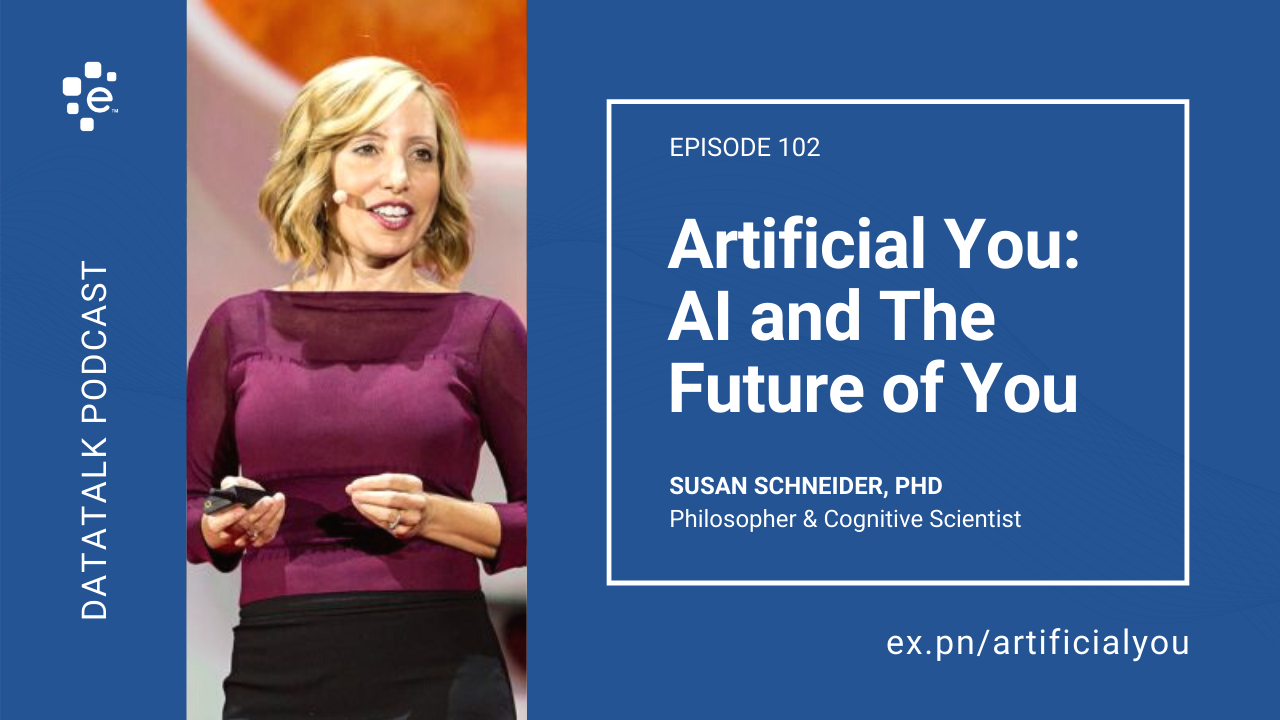Artificial You: AI and the Future of Your Mind w/ @DrSueSchneider (Episode 102) #DataTalk
Check out the podcast:
Every week, we talk about important data and analytics topics with data science leaders from around the world on Facebook Live. You can subscribe to the DataTalk podcast on iTunes, Google Play, Stitcher, SoundCloud, and Spotify.
DataTalk features data science leaders and academics at MIT, Caltech, United Nations, Gartner, Twitter, Salesforce, Amazon, UBER, IBM, LinkedIn, Spotify, Dow Jones and dozens of other top data and tech companies.
In this week’s #DataTalk, we chat with Dr. Susan Schneider about her book “Artificial You: AI and The Future of Your Mind.”
DataTalk is hosted by Mike Delgado, Director of Social Media at Experian. Please reach out if you have suggestions for topics or guests. Check out the complete list of data science videos and podcasts here.
About “Artificial You”
A sober-minded philosophical exploration of what AI can and cannot achieve.
 Humans may not be Earth’s most intelligent species for much longer: the world chess, Go, and Jeopardy! champions are now all AIs.
Humans may not be Earth’s most intelligent species for much longer: the world chess, Go, and Jeopardy! champions are now all AIs.
Given the rapid pace of progress in AI, many predict that AI could advance to human-level intelligence within the next several decades. From there, it could quickly outpace human intelligence. What do these developments mean for the future of the mind?
In Artificial You, Susan Schneider urges that it is inevitable that AI will take intelligence in new directions, but it is up to us to carve out a sensible path forward.
As AI technology turns inward, reshaping the brain, as well as outward, potentially creating machine minds, it is crucial to beware. Homo sapiens, as mind designers, will be playing with “tools” they do not understand how to use: the self, the mind, and consciousness.
Schneider argues that an insufficient grasp of the nature of self, consciousness, and mind could undermine the use of AI and brain enhancement technology, bringing about the demise or suffering of conscious beings. To flourish, we must grasp the philosophical issues lying beneath the algorithms.
At the heart of her exploration is a sober-minded discussion of what AI can truly achieve: Can robots really be conscious? Can we merge with AI, as tech leaders like Elon Musk and Ray Kurzweil, suggest? Is your mind just a program?
Examining these thorny issues, Schneider proposes ways we can test for machine consciousness, questions whether consciousness is an unavoidable byproduct of sophisticated intelligence, and considers the overall dangers of creating machine minds. Check out more details (and reviews) here.
About Dr. Susan Schneider
 Susan Schneider is an American professor of philosophy and cognitive science. She holds the NASA-Baruch Blumberg Chair at the Library of Congress and NASA, directs the AI, Mind and Society (“AIMS”) Group at the University of Connecticut, and is a visiting member of the Institute for Advanced Study in Princeton.
Susan Schneider is an American professor of philosophy and cognitive science. She holds the NASA-Baruch Blumberg Chair at the Library of Congress and NASA, directs the AI, Mind and Society (“AIMS”) Group at the University of Connecticut, and is a visiting member of the Institute for Advanced Study in Princeton.
She is also a recipient of the National Endowment for the Humanities Public Scholar Award. Schneider has been featured on television shows on The History Channel, Fox News, PBS and The National Geographic Channel, and in the feature film, Supersapiens: the Rise of the Mind.
Schneider’s work has come to the attention of numerous publications including The New York Times, Wired Magazine, Smithsonian, Big Think, Inverse, Discover Magazine, Science Magazine, Motherboard, Slate, Nautilus and Popular Mechanics
Schneider writes about the nature of the self and mind, especially from the vantage point of issues in philosophy, AI, cognitive science and astrobiology. Within philosophy, she has explored the computational nature of the brain in her academic book, The Language of Thought: a New Direction. More recently, she defended an anti-materialist position about the fundamental nature of mind. In her new book, Artificial You: AI and the Future of the Mind, she brings these topics together in an accessible way, discussing the philosophical implications of AI, and, in particular, the enterprise of “mind design.”
Her work in philosophy of AI has now taken her to the Hill (Washington, DC), where she will meet with members of Congress on AI policy and organize educational events for Congress and staffers in conjunction with the Library of Congress on a range of topics, such as data privacy, algorithmic bias, technological unemployment, autonomous weapons, and more. Schneider appears frequently on television shows on stations such as PBS and The History Channel as well as keynoting AI ethics conferences at places such as Harvard and Cambridge.
More resources from Dr. Schneider:
- The Future of the Mind: How AI Technology Could Reshape the Human Mind
- It May Not Feel Like Anything to Be an Alien
- Video: Transcending the Brain? AI, Radical Brain Enhancement
Check out our complete list of data science shows.
